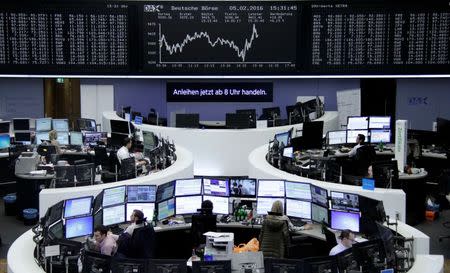Global stocks fall after U.S. jobs report muddles Fed outlook
By David Gaffen NEW YORK (Reuters) - Global stock markets slumped and the U.S. dollar rallied on Friday after a key U.S. jobs report painted a mixed picture of the labor market and left investors with a muddled view on interest rate hike prospects. Oil prices dipped, ending the week lower after two weeks of gains. Wall Street ended lower, led by plunging technology shares after poor results from data company Tableau Software and networking platform LinkedIn . The S&P 500 information technology sector fell 3.4 percent, while the Nasdaq Composite Index slumped to its lowest close since October 2014. While U.S. non-farm payrolls increased by just 151,000 jobs last month, well below forecasts of 190,000, the unemployment rate fell to 4.9 percent, the lowest since February 2008, and a sharp rise in wages suggested the labor market recovery remained on track. Despite the weak headline figure, markets took the rest of the payrolls report hawkishly. Fed funds futures contracts showed traders boosted their view of the chances of a Fed rate hike in December to about 40 percent. Before the report, they expected the Fed to wait until well into next year before raising rates again. The report helped the dollar rebound from two days of losses that forced the unwinding of large bets in favor of the greenback against other currencies worldwide. The dollar had weakened in recent days after dovish commentary from Fed officials, but some believe this report changes the calculus somewhat. The increase in U.S. hourly wages and decline in the unemployment rate "serves as a caution to markets that it is too early to take a Federal Reserve March hike completely off the table," said Mohamed El-Erian, chief economic advisor at Allianz in Newport Beach, California. The Dow Jones industrial average <.DJI> fell 211.75 points, or 1.29 percent, to 16,204.83, the S&P 500 <.SPX> lost 35.43 points, or 1.85 percent, to 1,880.02 and the Nasdaq Composite <.IXIC> dropped 146.42 points, or 3.25 percent, to 4,363.14. After a weak U.S. service-sector business sentiment report on Wednesday and dovish comments from New York Federal Reserve chief William Dudley, U.S. money markets shifted to forecast no move in official rates this year. The Fed's own forecasts, meanwhile, still suggest four increases by year-end, a pace many consider unlikely, which is likely to be addressed by Fed Chair Janet Yellen next week when she appears before Congress for semi-annual monetary policy testimony. The dollar index rose 0.5 percent to 96.945, having endured a pretty rough week. The dollar shed 2.7 percent this week as expectations that the Fed. The U.S. central bank, would raise rates at least once this year evaporated on signs of domestic weakness and broader concerns over global growth. The dollar's decline was spurred by traders unwinding complicated cross-market bets that involved borrowing in euro and yen and buying U.S. assets. U.S. Treasury note yields rose after the jobs report before falling back. The 10-year yield was little changed at 1.84 percent. Shorter-dated Treasuries were weaker, causing the yield curve to flatten, a signal of concern about economic slowdown. The 10-year yield has still fallen by 10 basis points since the start of this month. Crude oil dipped at the end of the day. Brent crude lost 1 percent to $34.13 a barrel, while U.S. crude fell 2.3 percent to $31.00. (Editing by Chizu Nomiyama and James Dalgleish)

 Yahoo News
Yahoo News 

